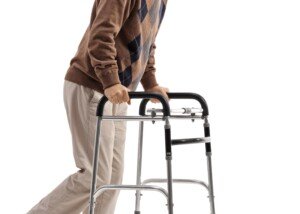
Do you know an elderly person who blacked out for no apparent reason, with no history of fainting?
An elderly person apparently blacks out and falls. First of all, you need to determine — if possible — that they actually passed out while upright, versus lost their footing or a knee buckled and then fell.
I’d been staying with my elderly parents to care for them; my mother was experiencing severe pain from a herniated disc, and my father had just had knee revision surgery.
The knee rehabbing was going good; my father got around on a walker. Though there was a lot of post-surgical pain, he was stable with the walker.
Then a THUD! in the Middle of the Night
Eight days after the surgery, I heard a thud at 3:30 in the morning; my mother called out to me.
I dashed into my parents’ room and found my father prone (stomach down) on the floor, shoulders and head in the bathroom.
His surgical knee was over the walker, which was lying on the floor.
I removed it from under the leg, and my first thought was that the knee surgeon goofed up; the hardware suddenly loosened.
I got on my knees and within seconds realized my father was disoriented and belligerent (not his nature), and not responsive to my simple commands to alter his body position so that I could better assist.
He was holding his stomach off the floor; only his forearms, knees, thighs and feet were making contact, and he was stuck in this position.
I immediately knew that this fall had not been broken consciously as he went down, because:
1) He had altered mentation, indicative of a significant whack on the head, and 2) He had a purple and red “goose egg” hematoma on his forehead, indicative of a hard fall.
Based on his body position, he had fallen forward. Because the walker had been under his leg, this meant that, just prior to the fall, he had slumped forward over the walker, body weight crumbling on top of it as he pitched forward, knocking the device over as he fell over it.
Sleuthing 101: He’d had a blackout while standing, while using the walker to get to the bathroom.
He had passed out, then fallen. The knee could not have given way; otherwise, he would have supported himself on the walker and remained upright.
Knee pain would not have made him fall over the walker and end up prone on the floor, walker under leg. Pain would have simply made him safely shuffle back to the bed.
The floor was clear of obstacles; tripping was ruled out. He had blacked out.
Why would a seemingly healthy elderly person black out?
I also considered that my elderly father didn’t actually black out, but instead, became so dizzy or lightheaded that he fell forward, still conscious but not grounded enough to break the fall. I suspected a narcotic painkiller contributed.
I also suspected his high blood pressure drug, Lisinopril, which can cause fainting as a side effect.
It was more than a coincidence that a fainting spell occurred in that tiny sliver of time during which my elderly father got up in the middle of the night to use the bathroom; I suspected a big blood pressure drop caused by medications.
Emergency room personnel suspected a “cardiac event” because a blood test revealed that his troponin was elevated.
He was admitted to the cardiac unit. The follow-up troponin test yielded no upward trend, so heart attack was ruled out.
The doctor suspected one of three things:
1) A combination of dehydration, physical stress from the recent knee surgery, Lisinopril side effect and Flomax side effect.
My father had been taking Flomax for quite a while, and the doctor said it causes dizziness in 30 percent of patients.
2) Heart rhythm disorder, or 3) Heart valve problem.
A heart rhythm and valve disorder were ruled out with tests. Blood sugar was normal, ruling out diabetes. CT scan of head was normal.
The diagnosis of exclusion, then, for why my elderly father blacked out, was “the perfect storm” of recent knee surgery stress, lack of hydration, Lisinopril and Flomax.
The doctor took him off the Lisinopril and Flomax.
A week out from the blackout, he continued to sometimes experience the “room swirling” upon sitting up from a back-down position on his bed.
Takeways from a Medical Doctor
“To prevent from having a fainting episode, it’s important to make sure you maintain a good hydration status,” says Amber Robins, MD, a board certified family medicine physician in NY.
“A good way to tell if you’re hydrated is by looking at your urine. If it is yellow, this means that you may need to drink more fluids.

Shutterstock/gritsalak karalak
“Keep in mind that you can also overdo your hydration which could lead to other medical issues.
“This is where speaking to your primary care doctor about your particular medical conditions may be most appropriate.
“After a knee replacement or any surgery, a patient may also be on pain medications. For some, this can lead to feelings of dizziness which could lead to having a fall.
“Again, I would suggest talking with your doctor to discuss a regimen that may be best for you.”
Remember, if an elderly family member has had surgery, hydration is super important.
However, clear with the surgeon just how much water a day the patient should be getting.
And make sure that the family member is taking any medications in their proper doses.










































